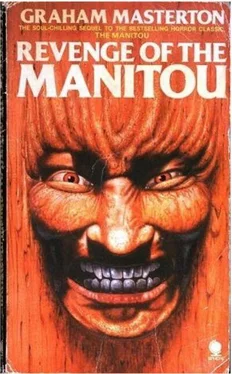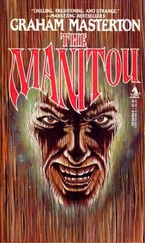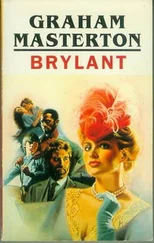He glanced up at Singing Rock. “I don’t particularly sympathize with Indians who want to change things back the way they were,” he said. “But I know what you probably feel about America. If it had once been my country, I’d feel the same way.”
Harry took out a handkerchief and mopped his face and neck. The tunnel seemed closer and hotter than ever, and quite apart from that, it was almost six-thirty, and there wasn’t much time left before the moon rose.
“Professor Thoren?” he said. “The translation?”
“Well, I don’t know how it’s going to help you,” shrugged the professor. “But here it is.
The first hieroglyph here is a kind of opening announcement. You could almost say it means ‘Now hear this.’ But the rest of it reads: ‘After the days when the greatest of the chiefs has passed beyond, and after the days when all the lands and the beasts that run on the land have been lost, then the magicians outside shall wait for nine hundred ninety-nine moons in darkness, until the day of the invisible stars, when they shall unite and call down Pa-la-kai and Nashuna and Coyote, the terrible ravager, and also call upon Ossadagowah, son of Sadogowah, and those outside who are in no human shape.’ ”
Professor Thoren paused, and looked up. “I don’t suppose it makes any sense to you so far,” he said. “But I can explain it if you want.”
Harry, pale-faced and sweating, shook his head. “We know what it means, professor.
Just get on with it.”
Professor Thoren was about to say something, but then he assumed a resigned face and turned back to the petrified tree. “Okay. Right here, on the sixth line, it says: ‘The wonder-workers shall take their due for the stealing of their lands and the beasts that run thereon, etcetera, and they shall also raise for this purpose that *which sleeps below the surface of the waters and which has been waiting since elder times.”
He looked up. “There is no corresponding word in the English language for that which sleeps below the surface of the waters, although it’s represented here by just one glyph. It doesn’t mean a fish, or a prehistoric monster, or anything like that. If you translated every nuance of this character, it actually means ‘the great and feared god of ancient times who was banished below the waves and has been dreaming ever since of his return to the shores of earth.’ ”
Singing Rock’s face was strained. He said, “Is there any more?”
Professor Thoren frowned. “You really take this seriously, don’t you? You’re not kidding around.”
“Professor,” insisted Singing Rock, “can you please tell me if there’s any more?”
“There’s one more line,” said the professor. “It says something like: ‘That which sleeps below the surface of the waters shall rise on that day on the bidding of Ossadagowah, and the massacre of the thousands shall begin.’ The word they’ve used here for ‘massacre’ could mean ‘butchery’ or ‘dismemberment.’ It’s a very ancient glyph which was often used to describe sacrificial rituals.”
Singing Rock was silent for a while. He seemed to be searching deep down inside of himself for something he had heard years and years before, from the lips of the medicine men who had taught him when he was young. Professor Thoren glanced at Harry inquiringly, but all Harry could do was shrug.
At last, Singing Rock said, “Professor, I think we have to leave now. I’m very glad we found you here, and I want to apologize for sounding so abrupt and demanding.
You’ve been most helpful.”
“Hold up,” said Professor Thoren. “You can’t just waltz in here and take a whole year’s work and then waltz out again without offering something in return.”
“Oh, I’m sorry,” said Singing Rock, and he reached into his coat pocket. “Would an ounce of chewing tobacco do?”
“Mister,” said Professor Thoren impatiently, “what I’m talking about is a little cultural cross-pollination. I know what these hieroglyphs say but I don’t know what they mean. I’ve never heard of anything like this. You can’t simply walk out without telling me what you know about it.”;
“Professor,” responded Singing Rock seriously, “the reason you don’t know what they mean is because of all Red Indian legends this is the most feared and the most secret. It is the legend of the greatest of the elder gods and it has been kept from the white man for centuries, because of what the white man might unwittingly raise up if he spoke the sacred spells.”
“You believe this?” asked Professor Thoren. “You actually believe that if the spells were cast, you’d raise up some kind of ancient god?”
Singing Rock stared at him defiantly. Then, in a slow voice that was rich with dignity, he said, “Yes, professor, I believe it. I believe in the gods because they have often come to my aid when I was weak and uncertain. I believe in the gods because they still live and breathe and speak to me from the lands that once belonged to my people. I believe in the gods because they will care for my manitou when I pass to the great outside.”
“Very well,” said Professor Thoren, a little abashed. “Then what god is this, the one who sleeps below the waves?”
“There are many stories about him,” said Singing Rock. “He was said to be cloudy and amorphous, and sometimes to be of such a size that he would tower over the earth. His face was a hellish confusion of serpents, and his jaws were like a chasm.
So the stories say, anyway.”
“He sounds pretty alarming. Who managed to banish him below the waves? It must have been someone with real magical talent.”
“It was,” agreed Singing Rock. “But in those days, almost every Indian wonderworker was amazingly powerful. It was said that many of them could juggle with miniature suns, and cross the waters without a canoe. The wonder-worker who banished this particular god, though, was the greatest of all the wonder-workers.
It was Misquamacus, sometimes known as Quamis, or Quanquus. The stories say that Misquamacus dismissed him below the waters of the earth and placed a spell on the waters so that the god could never emerge again through the watery portal into the world of humans. He couldn’t send the god back to the great outside, of course.
Gods of that magnitude will only return of their own free will. But Misquamacus protected his people sufficiently well for them to flourish and grow, without being molested for human sacrifices or massacred as they slept.”
“But it says here that the god is going to be raised again,” Professor Thoren pointed out. “If he preyed on red men as well as white men, why would the wonderworkers want to do that?”
“A god who is released from a spell bears a debt of gratitude to those who let him out,” said Singing Rock. “That is part of the exact balance of Indian magic.”
“Even if whoever lets him out is the same person who put him under the spell in the first place?” asked Harry.
“It makes no difference,” nodded Singing Rock. “You see, the god wouldn’t have been put under the spell at all if he hadn’t been savaging or frightening the wonderworker’s people, and so the balance would be maintained.”
Professor Thoren said, “Does this elder god have a name? Something I might recognize?”
“Most of the elder gods have hundreds of names,” said Singing Rock. “The Natick Indians of Boston used to call this god Paukunnawaw, the Great Bear, because he came at night like a bear and left their people hideously mauled. When Cotton Mather talked to the Na-ticks in the seventeeth century, he asked them what they knew of the stars, and they pointed up to the sky and said Paukunnawaw. Mather was delighted, because he thought the Indians miraculously knew the European name for the constellation of the Great Bear. What he didn’t realize was that they were telling him about the elder god who came from the stars and devoured them.
Читать дальше












